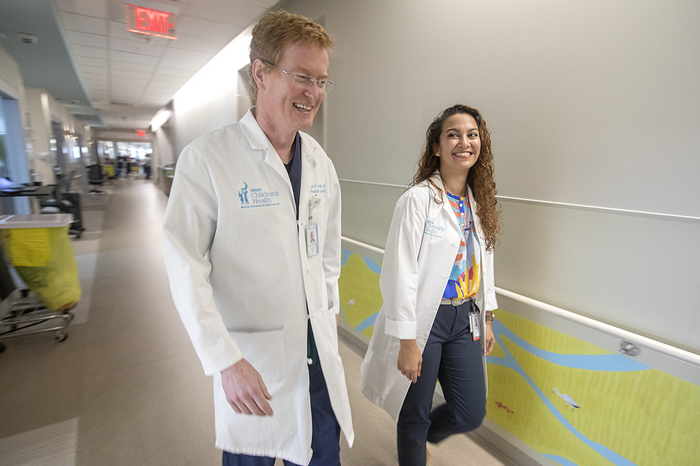Race was already known to matter when it came to health outcomes for infants with congenital heart disease (CHD), the most common birth defect, affecting 1 in 100 live births. In the first year of life, African Americans are 1.4 times more likely and Hispanics are 1.7 times more likely to die due to CHD than Whites. However, no one knew why race affected those outcomes.

Credit: Medical University of South Carolina, Sarah Pack
Race was already known to matter when it came to health outcomes for infants with congenital heart disease (CHD), the most common birth defect, affecting 1 in 100 live births. In the first year of life, African Americans are 1.4 times more likely and Hispanics are 1.7 times more likely to die due to CHD than Whites. However, no one knew why race affected those outcomes.
“We’ve known for a couple decades now that outcomes are worse in minority groups, compared with their White counterparts,” said John Costello, M.D., pediatric cardiologist and director of research for the MUSC Children’s Health Pediatric & Congenital Heart Center at MUSC Shawn Jenkins Children’s Hospital. “But it really has never been understood why these differences in outcomes exist.”
There is now a partial answer to that question, thanks to a joint effort between Costello; MUSC Children’s Health pediatric cardiology fellow Stephanie Santana, M.D.; and their colleagues at the University of California San Francisco (UCSF) and Northwestern University. They report in the Journal of Pediatrics that the state of the mother’s health during pregnancy can partially explain the racial differences in outcomes of CHD patients.
As a first-generation Hispanic physician, Santana has always been passionate about health disparities. At MUSC, she became interested in why CHD outcomes are worse in infants of color. After discussing these interests with Costello, the two reached out to collaborators at UCSF and Northwestern. Together, they tapped into a large California administrative dataset that allowed them to make connections between maternal health and outcomes for infants with CHD. An earlier conference presentation about this work led to Santana receiving the 2021 American Heart Association’s Outstanding Research Award in Pediatric Cardiology.
The recently published study is unique in that it not only assessed the health of infants with CHD but also that of their mothers. This maternal component was important to include, as CHD begins during development when the baby and mother are interconnected in the wombs.
“The journey of a child or adolescent or patient with congenital heart disease doesn’t start at birth,” said Santana. “It starts in that mother-baby unit and all the influences and factors that negatively or positively impact that environment.”
This investigation assessed the records of over 8,000 infants and their mothers from diverse populations. It found that placental and metabolic syndromes in the mother during pregnancy explained 25% of the disparity in CHD outcomes in Blacks and 18% in Hispanics. Among the conditions associated with these syndromes are high blood pressure, obesity, diabetes and high cholesterol levels.
The findings are exciting, according to Santana, because these conditions can be treated.
Armed with the knowledge from this study, she believes doctors can modify treatment plans for at-risk mothers. For example, they can provide education or preventive medications. While there is still a long way to go to address the racial disparities in CHD, Santana thinks identifying one of the factors accounting for them gives hope for improved outcomes in the future.
“One of the first steps is naming these factors and showing that there is a difference,” said Santana. “Whether we change that factor by removing it, by educating mothers about it or by treating them with different medications, I think it opens the door.”
###
About MUSC
Founded in 1824 in Charleston, MUSC is home to the oldest medical school in the South as well as the state’s only integrated academic health sciences center, with a unique charge to serve the state through education, research and patient care. Each year, MUSC educates and trains more than 3,000 students and nearly 800 residents in six colleges: Dental Medicine, Graduate Studies, Health Professions, Medicine, Nursing and Pharmacy. MUSC brought in more than $327.6 million in biomedical research funds in fiscal year 2021, continuing to lead the state in obtaining federal and National Institutes of Health funding, with more than $220 million. For information on academic programs, visit musc.edu.
As the clinical health system of the Medical University of South Carolina, MUSC Health is dedicated to delivering the highest-quality and safest patient care available while training generations of compassionate, competent health care providers to serve the people of South Carolina and beyond. Patient care is provided at 14 hospitals with approximately 2,500 beds and five additional hospital locations in development, more than 300 telehealth sites and nearly 750 care locations situated in the Lowcountry, Midlands, Pee Dee and Upstate regions of South Carolina. In 2021, for the seventh consecutive year, U.S. News & World Report named MUSC Health the No. 1 hospital in South Carolina. To learn more about clinical patient services, visit muschealth.org.
MUSC and its affiliates have collective annual budgets of $4.4 billion. The more than 24,000 MUSC team members include world-class faculty, physicians, specialty providers, scientists and care team members who deliver groundbreaking education, research, technology and patient care.
Journal
The Journal of Pediatrics
DOI
10.1016/j.jpeds.2022.06.036
Method of Research
Data/statistical analysis
Subject of Research
People
Article Title
Adverse Maternal Fetal Environment Partially Mediates Disparate Outcomes in Non-White Neonates with Major Congenital Heart Disease
Article Publication Date
4-Jul-2022




